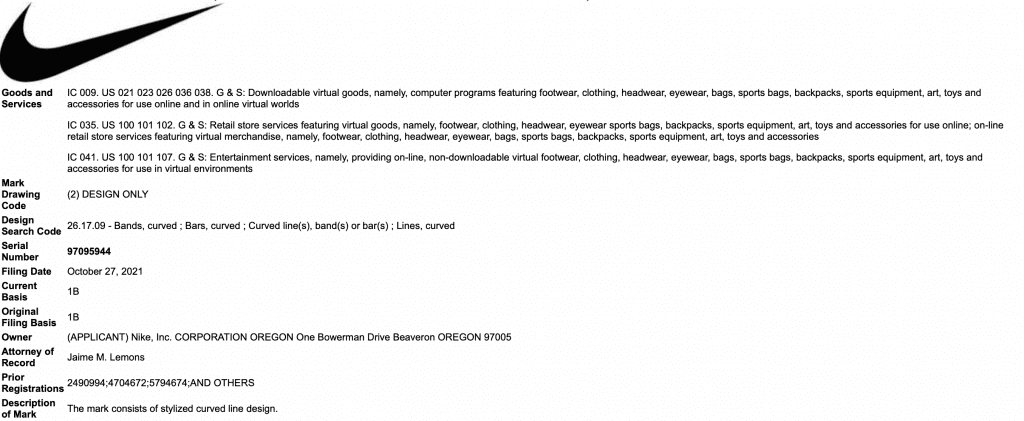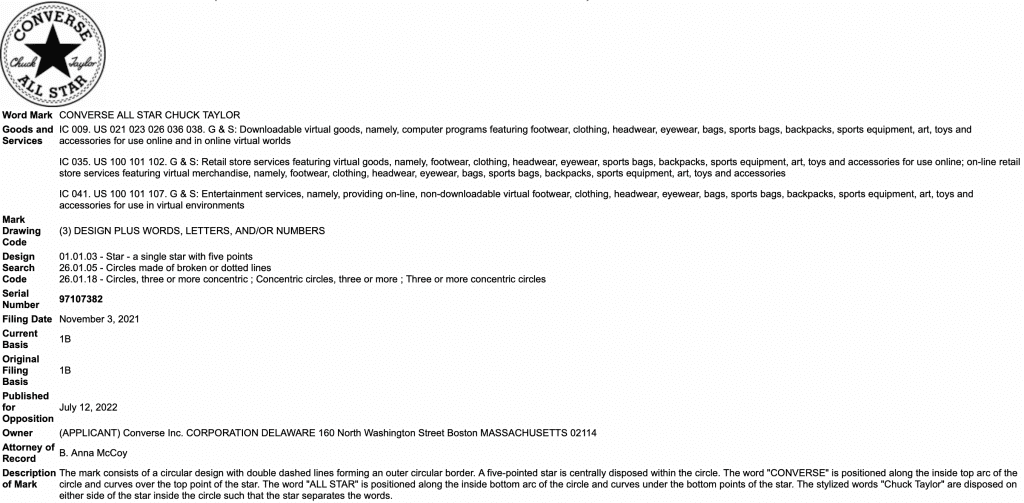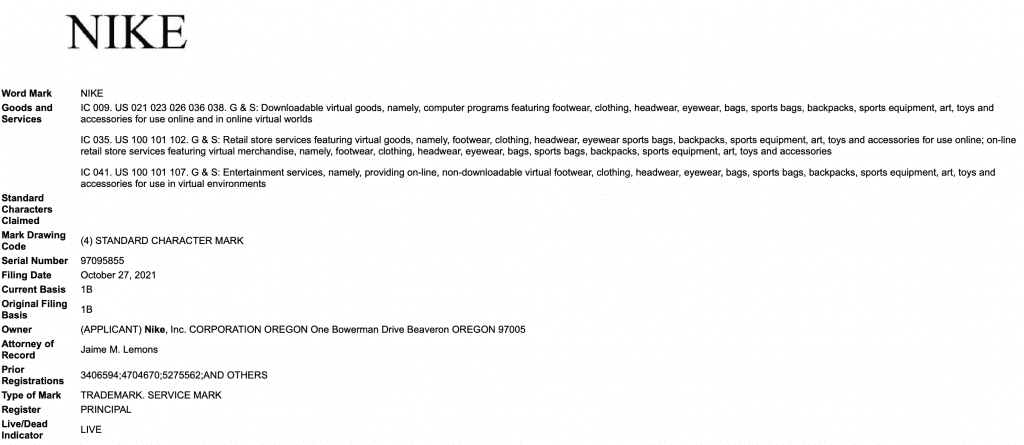Deep Dives
Nike is facing some preliminary pushback from the U.S. Patent and Trademark Office (“USPTO”) in response to trademark applications for registration that it filed last fall for use of some of its most famous marks in the metaverse. The sportswear titan made headlines in October in the wake of lodging a number of intent-to-use applications with the USPTO for its name, Swoosh logo, “JUST DO IT,” and Jordan marks for use on “downloadable virtual goods” (in Class 9), “retail store services featuring virtual goods” (Class 35), and “entertainment services, namely, providing on-line, non-downloadable virtual footwear, clothing, headwear, eyewear, bags, sports bags, backpacks, sports equipment, art, toys and accessories for use in virtual environments” (Class 41).
Fast forward from October 2021 to late this month, USPTO examining attorney Barbara Rutland has issued a handful of Office actions, requiring Nike to clarify its “indefinite” identification of the goods and/or services in connection with which it is looking to claim rights in – and registrations for. Rutland states in response to each of the metaverse-related applications that the “precise nature of the goods and services is unclear,” and encourages Nike to substitute the “clarifying wording in bold print, if accurate” …
Class 9: Downloadable virtual goods, namely, computer programs featuring footwear, clothing, headwear, eyewear, bags, sports bags, backpacks, sports equipment, art, toys and accessories for use online in online virtual worlds.
Class 35: Retail store services featuring virtual goods, namely, footwear, clothing, headwear, eyewear sports bags, backpacks, sports equipment, art, toys and accessories for use online in online virtual worlds; on-line retail store services featuring virtual merchandise, namely, footwear, clothing, headwear, eyewear, bags, sports bags, backpacks, sports equipment, art, toys and accessories for use online in online virtual worlds.
Class 41: Entertainment services, namely, providing on-line, non-downloadable virtual footwear, clothing, headwear, eyewear, bags, sports bags, backpacks, sports equipment, art, toys and accessories for use in virtual environments created for entertainment purposes.

Elsewhere under the Nike, Inc. umbrella, Converse got the go-ahead for publication of three of the metaverse-focused trademark applications for registration that it filed in early November 2021. The USPTO issued notices of publication on June 22 for the applications for “CONVERSE” word mark, “a five-pointed star oriented to the left of a chevron design,” and Converse Chuck Taylor All Star logo without any previous pushback in the form of Office actions. The applications claim use (on a 1(b) basis) on the following goods/services …
Class 9: Downloadable virtual goods, namely, computer programs featuring footwear, clothing, headwear, eyewear, bags, sports bags, backpacks, sports equipment, art, toys and accessories for use online and in online virtual worlds.
Class 35: Retail store services featuring virtual goods, namely, footwear, clothing, headwear, eyewear, sports bags, backpacks, sports equipment, art, toys and accessories for use online; on-line retail store services featuring virtual merchandise, namely, footwear, clothing, headwear, eyewear, bags, sports bags, backpacks, sports equipment, art, toys and accessories.
Class 41: Entertainment services, namely, providing on-line, non-downloadable virtual footwear, clothing, headwear, eyewear, bags, sports bags, backpacks, sports equipment, art, toys and accessories for use in virtual environments.

In addition to calling on Nike to be more specific in its identification of the goods and/or services at issue, in a few of the newly-issued Office actions, Rutland provides it with a prior-filed application advisory. According to these Office actions, while a review of the USPTO database of registered and pending marks did not result in a finding of any “conflicting registered marks that would bar registration,” a mark in a prior-filed pending application “may present a bar to registration of [Nike’s] mark” in the event that it is registered because of “a likelihood of confusion between the two marks.”
In response to Nike’s application for registration for its word mark and another for a combination of the Nike name and Swoosh logo (both for use on “downloadable virtual goods,” “retail store services featuring virtual goods” and “entertainment services, namely, providing on-line, non-downloadable virtual footwear,” etc.), for instance, Rutland cites an earlier-filed application for “NIKE UNLIMITED CARE LLC” for use “on-line retail store services featuring first aid supplies, autism supplies and CPR (cardiopulmonary resuscitation) supplies” (Class 35). The USPTO similarly states that there may be an issue with Nike’s application for “JUST DO IT” (also for use on “downloadable virtual goods,” “retail store services featuring virtual goods” and “entertainment services, namely, providing on-line, non-downloadable virtual footwear,” etc.) due to a previously-filed application for “JUST FUCKIN DO IT” for use on stickers (in Class 16).
With these prior-filed application advisories in mind, Rutland states that Nike can response to the Office actions with arguments in support of registration by addressing the issue of the potential conflict between its mark and the mark in the previously-filed application – or may do so later if faced with a refusal under Section 2(d).
It is not difficult to imagine Nike arguing that it has superior rights in the “NIKE” mark, especially given that Nike Unlimited Care LLC is not yet claiming use in commerce. In fact, Nike makes this argument in the opposition that it lodged against the “NIKE UNLIMITED CARE LLC” application on June 22, asserting that it has made consistent use of the “NIKE” word mark across an array of goods/services since at least 1974 and that Nike Unlimited Care LLC’s mark “incorporates [its own] mark in its entirety.” Given that Nike Unlimited Care LLC disclaims “Unlimited Care LLC” in its application, Nike argues that the word “NIKE” is “the dominant part of [its] mark,” and is likely to confuse consumers and dilute the strength and distinctiveness of the “NIKE” name.
At the same time, the “JUST FUCKIN DO IT” mark does not seem like it will stand in the way of a registration for Nike, primarily because the USPTO already preliminarily refused it in an Office action in July due to a likelihood of confusion with four of Nike’s already-registered “JUST DO IT” marks. (The individual that filed the application for registration for “JUST FUCKIN DO IT” has not responded to the Office action yet – and there is, of course, no guarantee that he will not simply abandon the application.)

Among the most attention-grabbing applications for metaverse-related trademarks, Nike’s October 2021 filings swiftly prompted other companies to rush to the USPTO to file applications of their own for use of their “real world” marks on virtual goods and services, as well as non-fungible tokens. (As recently as this month, both Louis Vuitton and Gucci filed trademark applications for registration with the USPTO for some of their most famous trademarks for use in the virtual world. You can see them here on our running list of metaverse marks.) The Office actions are the first substantive development since Nike filed those applications last year.
As for whether companies need to seek out registrations for their well-known “real world” marks for use on “downloadable virtual goods,” “retail store services featuring virtual goods” and “entertainment services, namely, providing on-line, non-downloadable [apparel and footwear],” NFTs, etc., they probably do not. While companies certainly can benefit from a more robust arsenal of registrations, chances are, their existing “real world” rights may be enough to bring infringing uses to a halt.
The latest round in the Hermès v. Mason Rothschild case suggests that brands not only do not need trademark registrations for their marks for use in metaverse or on NFTs, they may not even need to be using their marks in metaverse or on NFTs to successfully call foul when others are using their marks. Hermès’ use of its Birkin name and well-known design do really extend into the virtual realm – it maintains an e-commerce site but no metaverse ventures and no NFTs. And yet, in an order last month, in which he refused to grant Rothschild’s motion to dismiss, Judge Jed Rakoff of the U.S. District Court for the Southern District of New York seemed to suggest that Hermès’ “real world” trademark rights would at least somewhat neatly extend to the virtual world if Rothschild’s NFTs were tied to “a digital file of a virtually wearable Birkin,” as opposed to static images of fur-covered Birkin bags.
This seems to fall in line with an assertion from an article earlier this year, in which Martin Schwimmer, a partner in the Trademark and Copyright Practice Group at Leason Ellis, stated that at the end of the day, with regards to “a company’s main line of work, its existing trademark portfolio will probably cover the most predictable of their activities in the metaverse. So, just as Nike does not need to file applications for shoes and shoes sold over the internet, they will not need to file for shoes sold via the metaverse.” That is, of course, not stopping brands like Nike and co. from filing, though – and providing a road map for others to follow.